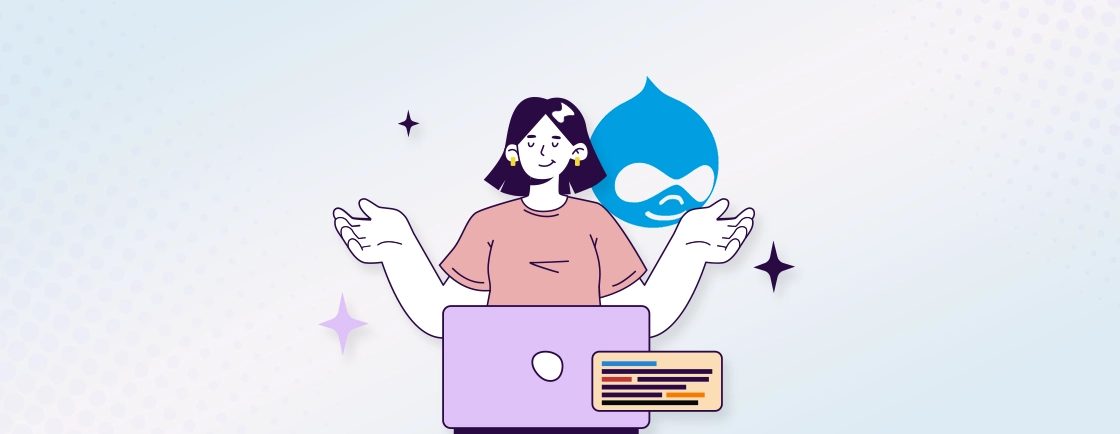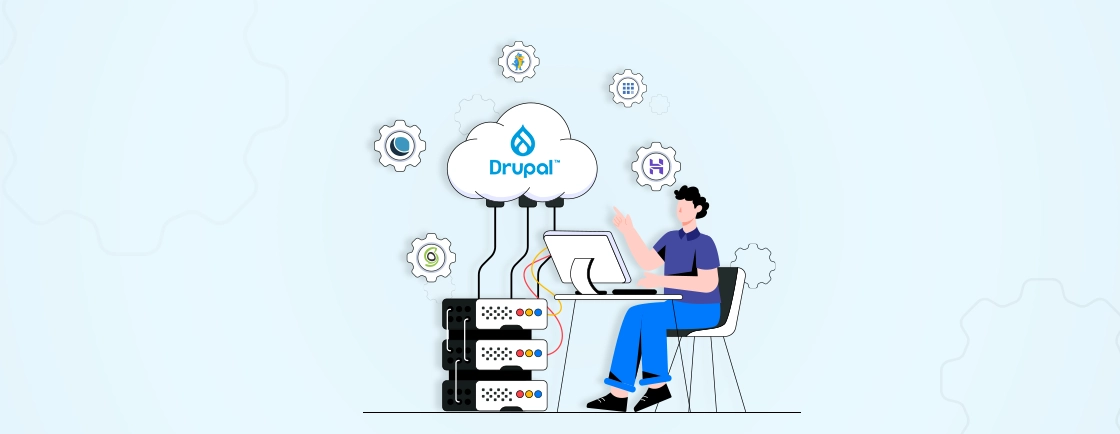Table of Contents
Do you need a powerful Drupal website but don’t have the in-house team to build it? You’re not alone, many businesses face this issue.
That’s why many companies are choosing to outsource Drupal development. It’s a faster way to get expert help, save time, and keep your project on track without hiring a full-time team.
In this blog, we’ll walk you through what Drupal development involves, why outsourcing makes sense, and how to do it the right way.
Overview of Drupal Development
Drupal is an excellent platform for creating, customizing, and maintaining websites. With Drupal, you can flexibly create diverse digital experiences and robust online solutions. This open-source platform empowers businesses and organizations to manage and scale their web presence efficiently.
One of the best highlights of Drupal is its modular approach, which allows for immense customization and scalability. It allows you to assemble different building blocks (like content types, modules, themes, etc.). That makes Drupal suitable for everything from simple blogs to complex web applications.
Key Concepts of Drupal Development
- Content Types: Define the structure of your content, like articles, pages, or products.
- Modules: Extend Drupal’s core functionality with features like user registration, eCommerce, or social media integration.
- Themes: Control the visual appearance of your website, from layout to colors and fonts.
- Hooks & Plugins: Allow you to customize Drupal’s behavior and integrate it with other tools.
These technical aspects of Drupal may not be everyone’s cup of tea. But since they can help create high-quality solutions, it’s important to use them effectively. That’s where outsourcing comes in.
You can outsource your requirements to an experienced Drupal development company. They have the expertise to give the best solutions to your Drupal queries. Still not convinced?
Why Outsource Drupal Development?
Drupal is an open-source platform, which gives it DIY development flexibility. Although you can cover the basics yourself, outsourcing opens up a whole new bank of benefits. That is especially the case in projects with technical complexity or resource limitations. When businesses evaluate the overall effort involved, they also start considering factors that influence Drupal website development cost, helping them make informed decisions about whether to build internally or collaborate with experts.
Let me give you a few reasons why outsourcing Drupal development would be a good idea.
- Deep Drupal Knowledge: Tapping into a team with extensive Drupal experience ensures they navigate complex functionalities, security updates, and custom integrations seamlessly.
- Diverse Skill Sets: Drupal development service providers give you access to developers with top skills. They can handle areas like front-end development, backend architecture, and performance optimization effectively.
- Staying Ahead of the Curve: Leverage their expertise in industry best practices and emerging Drupal trends, ensuring your website remains technically sound and competitive.
- Focus on Core Business: Delegate technical aspects to professionals. It frees your team to focus on content creation, marketing, and core business activities.
- Agile Project Management: Leverage established processes and methodologies for efficient project delivery. It minimizes delays and ensures timely completion.
- Future-proof Development: Outsource partners can scale their resources as your website grows, adapting to changing requirements and traffic fluctuations smoothly.
- Reduced Hiring & Training Costs: Avoid the overhead of recruiting, training, and managing an in-house development team.
- Transparent Cost Structures: Opt for engagement models like fixed-price projects or hourly rates, ensuring predictable and manageable expenses.
- Access to Global Talent: Explore options in regions with competitive talent pools, potentially achieving cost-effective solutions without compromising quality.
- Proactive Security Measures: Benefit from the partner’s expertise in Drupal security best practices, minimizing vulnerabilities and protecting your website from potential threats.
- Regular Updates and Maintenance: Ensure timely updates to Drupal core, modules, and themes, maintaining optimal performance and security posture.
- Dedicated Support: Access ongoing technical support and troubleshooting, resolving issues quickly and minimizing downtime.
By choosing the right partner and establishing clear communication, you can ensure the best results for your web development project. So, how do you choose the right partner to outsource Drupal development?
How to Outsource Drupal Development?
Now that you have decided to outsource your Drupal website development, it’s time to choose the right partner and start the project. There are a plethora of Drupal development companies vying for your attention. But how do you find the one that matches your project perfectly? And how do you evaluate and select the best one? Here’s a guide to help you out.
Define Your Project Requirements
The first step in outsourcing Drupal development is to define the project requirements. This foundational stage of the process ensures transparency and aligns expectations with your partner. That ultimately leads to the best path to success. Here’s what you need to include in your “job description” for the Drupal outsourcing partner:
- Purpose: What is the primary objective of your website? Are you aiming to build an eCommerce store, a community platform, or a content-rich blog?
- Target Audience: Who are you trying to reach? Understanding your audience’s demographics, interests, and online behavior helps shape the website’s features and functionalities.
- Desired Outcomes: What do you hope to achieve with your website? Increased sales, brand awareness, lead generation, or community engagement? Setting clear goals provides direction and helps measure success.
- Functionalities & Features: List all the functionalities your website needs, such as user registration, product listings, search functionality, content management system, etc. Be specific about features like payment gateways, social media integrations, etc.
- Technical Requirements: Do you have specific technology needs like integrations with external systems, API connections, or something else?
- User Experience (UX): How do you want users to navigate and interact with your website? Define the desired user flow, information architecture, and overall navigation scheme.
- Design & Branding: Describe your desired visual style, including logo usage, color scheme, typography, and imagery. Consider how your website needs to align with your existing brand identity.
- Budget: Define a realistic budget for the project, considering development costs, ongoing maintenance, and potential future needs.
- Timeline: Establish a clear timeline for project completion, taking into account the complexity of features, team size, and potential iterations.
- Level of Involvement: Do you want a fully hands-off approach or plan to actively participate in decision-making and provide feedback?
Create a detailed project requirements document outlining all the above points. This serves as the source of info for both you and your outsourcing partner.
Research and Shortlist Potential Candidates
Selecting the right Drupal outsourcing company is the most crucial aspect of this whole process. This company will handle your Drupal development project and its chances of success. So you need to be careful and calculated when researching the potential candidates. Here are a few things to check during the selection.
- Certifications: Look for companies with Drupal certifications, like Acquia Certified Partner or Drupal Association memberships. These indicate a commitment to best practices and ongoing knowledge development.
- Community Involvement: Check their activity in Drupal forums, events, and contribution history. Active participation implies deep understanding and dedication to the platform.
- Project Portfolio: Analyze their past projects, focusing on those similar to yours in size, scope, and industry. Assess their design capabilities, technical complexity, and attention to detail.
- Client Testimonials: Read case studies and testimonials on company websites and independent platforms. Focus on client feedback that is aligned with your needs.
- Industry Awards & Recognition: Consider companies recognized for Drupal excellence by industry bodies or publications.
- Clutch, Upwork, GoodFirms: Explore freelance platforms and directories specifically catering to Drupal development. Filter based on location, budget, and project requirements.
- Company Blog & Resources: Review their blog posts and white papers for technical expertise, industry knowledge, and thought leadership.
You can also ask for recommendations on where to hire a Drupal developer from your colleagues, peers, and professional networks (on LinkedIn). See if they have any positive outsourcing experiences.
Based on your research, choose 3-5 companies that seem most aligned with your needs and values. Then you can ask for proposals.
Request for Proposals and Quotes
After shortlisting the potential Drupal development partners, you need to ask them for a clear and concise proposal. This document highlights how the Drupal company will proceed with your project, along with the cost and timeline.
For the proposals, highlight the following things.
Project Overview
- Briefly introduce your company, website goals, and target audience.
- Describe the type of website you need (e.g., e-commerce store, content-rich blog, community platform).
- Highlight any existing website elements you want to keep or migrate.
Project Scope & Requirements
- List the core functionalities and features you need, including specific modules or integrations.
- Describe desired user experience (UX) elements like navigation flow and content layout.
- Outline any technical requirements like integrations with external systems or API connections.
- Specify your expectations for design aesthetics and branding consistency.
Deliverables & Timeline
- Clearly define the deliverables you expect at each project stage (e.g., wireframes, prototypes, final website).
- Set a realistic timeline for project completion, considering complexity and desired milestones.
- Be flexible with potential adjustments based on partner feedback and feasibility assessments.
Budget & Payment Schedule
- Indicate your budget range or preferred engagement model (fixed-cost, hourly rates, retainer).
- Outline your preferred payment schedule (e.g., upfront deposit, milestones, final payment).
- Be open to discussing alternative pricing options proposed by potential partners.
Selection Criteria
- Explain how you will evaluate proposals and select your partner (e.g., expertise, experience, communication style, cost).
- Highlight specific factors that are important to you (e.g., proven Drupal experience, industry knowledge, portfolio relevance).
Along with these, you can share any relevant documentation like existing website analytics, user personas, or brand guidelines. But make sure you keep it focused and concise and use clear language.
Evaluate the Candidates
Now, you can start evaluating the Drupal companies based on the proposals sent by them. Here’s what you need to consider during the evaluation:
- Proposal Depth: Did they address your queries thoroughly? Have they proposed creative solutions and demonstrated a clear understanding of your needs?
- Technical Expertise: Assess their familiarity with specific modules, development methodologies, and security best practices relevant to your project.
- Communication Clarity: Are they responsive, articulate, and able to explain complex concepts clearly? Do they actively listen and ask clarifying questions?
- Project Approach: Discuss their proposed methodology, development process, and timeline. Do they align with your expectations and preferred working style?
- Unrealistic Promises: Beware of companies offering impossibly low prices or unrealistic timelines. Quality development takes time and expertise.
- Lack of Transparency: Be wary of companies hesitant to share details about their team, methodology, or pricing structure.
- Poor Communication: If communication feels forced or one-sided, consider it a red flag for future collaboration.
Beyond that, you need to trust your gut feeling. What is your initial impression of each candidate? Do you feel confident and excited about their approach?
I suggest you prepare a scorecard-like sheet based on the evaluation criteria. That will help you compare the candidates objectively and select the best Drupal development agency.
Negotiate and Sign the Contract
After evaluating the candidates, I imagine you have selected the most suitable one. Now, it’s time to get on with the negotiations and build a well-defined contract. It ensures both parties are on the same page and protects your interests for a smooth project journey.
Here are the key terms you need to negotiate:
- Project Scope: Clearly define deliverables, functionalities, and exclusions to avoid misunderstandings later.
- Timeline & Milestones: Establish realistic deadlines for key project stages and agree on milestone deliverables for progress tracking.
- Payment Schedule: Negotiate a payment schedule aligned with milestones or deliverables, considering upfront deposits and final payments.
- Change Management: Define a clear process for handling potential scope changes, including impact on timeline, budget, and approval procedures.
- Intellectual Property (IP): Ensure ownership of all developed code and content resides with you, outlining any exceptions for pre-existing assets.
- Confidentiality: Ensure the partner safeguards your sensitive information and project details.
- Warranties & Guarantees: Define the level of warranty offered on the developed website and any performance guarantees.
- Dispute Resolution: Establish a clear process for resolving any disagreements that may arise during the project.
- Termination Clause: Outline the conditions under which either party can terminate the agreement.
You can also consult with a legal counsel to ensure the contract is air-tight and protects your interests. And aim for mutually beneficial terms that consider your needs and the partner’s expertise.
Manage the Project
Once the contract is signed and the excitement settles, the real work begins, i.e., managing your Drupal development project. This phase needs effective communication and proactive collaboration to bring your vision into reality.
Here’s how you manage the outsourced Drupal project:
- Regular Meetings: Schedule weekly or bi-weekly meetings to discuss progress, challenges, and next steps. Utilize video conferencing for clear communication and face-to-face interaction.
- Project Management Tools: Leverage project management platforms like Asana, Trello, or Jira. They will help track tasks, deadlines, and team communication.
- Dedicated Communication Channels: Set up a shared communication platform like Slack or Microsoft Teams for real-time discussions and file sharing.
- Maintain realistic expectations: Be flexible and adaptable as unforeseen challenges can arise during development.
- Establish Feedback Protocols: Define a clear process for providing feedback, including timelines, formatting, and preferred channels.
- Provide Prompt Feedback: Don’t delay feedback, as it can hinder progress and create bottlenecks.
- Document All Changes: Clearly document any deviations from the initial scope, outlining new functionalities, deadlines, and potential budget impacts.
- Regularly Review Progress: Monitor project progress, track milestones, and address any potential roadblocks proactively.
- Ask Questions and Seek Clarification: Don’t hesitate to ask questions and clarify doubts to ensure you understand technical processes and decisions.
- Participate in Testing and Quality Assurance: Actively participate in testing phases, providing feedback and ensuring the website meets your quality standards.
- Build Positive Relationships: Treat your partner as a collaborative team member, fostering a respectful and positive work environment.
I can’t stress enough on the importance of maintaining documentation. Whether it’s for the decisions, changes, or communication for future reference, the documentation will be helpful.
By following these steps and choosing a qualified partner, your Drupal project development will be efficient and successful.
Best Practices for Outsourcing Drupal Development
Let’s say you have selected the best Drupal development experts or, rather, a team. Now, how do you ensure and maximize the success of the outsourced project? Here are a few best practices for this.
- Invest in relationship building: Go beyond a formal contract and foster genuine connections with the development team. This fosters trust, understanding, and a willingness to go the extra mile.
- Involve the team in decision-making: Seek their expertise and suggestions when faced with challenges or opportunities. Collaborative decision-making leads to better outcomes.
- Set clear communication expectations: Define preferred communication channels, frequency, and response times. Ensure prompt and open communication throughout the project.
- Conduct regular progress reviews: Schedule weekly or bi-weekly meetings to discuss progress, challenges, and next steps. Openly share concerns and actively listen to feedback.
- Establish a clear change management process: Define how new requirements or scope changes will be proposed, reviewed, approved, and documented. This prevents confusion and ensures everyone is on the same page.
- Maintain clear documentation: Record all changes, including justification, approval, and timeline adjustments. This provides a clear audit trail and avoids miscommunication.
- Break down the project into smaller, manageable sprints: This allows for iterative development, feedback loops, and quicker course corrections as needed.
- Prioritize features and functionalities: Identify and prioritize essential features for early delivery. That ensures progress and value realization even within tight deadlines.
- Plan for ongoing maintenance and support: Don’t think of the project as ending with a launch. Discuss ongoing maintenance plans, bug fixes, and security updates to ensure the website’s long-term health.
These practices will help you go beyond simple outsourcing. It will help you get a Drupal website that meets your requirements and exceeds expectations.
To Conclude
Outsourcing your Drupal development project can save you time and resources. The service provider takes care of the development aspect of the project while you focus on your core competencies.
To outsource your Drupal project,
- Define Your Project Requirements
- Research and Shortlist Potential Companies
- Request for Proposals and Quotes
- Evaluate the Candidates
- Negotiate and Sign the Contract
- Manage the Project
So, do you need help with your Drupal project? Then our services would be suitable.
FAQs on Outsourcing Drupal Development
Can I outsource specific tasks, or do I have to outsource the entire project?
You have the flexibility to outsource specific tasks or the entire project, depending on your needs and budget. Some service providers also offer customized packages to meet your specific requirements.
How do I ensure the security of my website during the outsourcing process?
Before outsourcing your Drupal development project, make sure to sign a Non-Disclosure Agreement (NDA) with the service provider to protect your confidential information. You can also ask for their security measures and protocols to ensure the safety of your website.
How do I choose the right service provider for my Drupal development needs?
When looking for a service provider for your Drupal development needs, consider their experience, expertise, portfolio, and client reviews. It’s also essential to communicate your project requirements and expectations clearly.
Unleash the Potential of Drupal
Access expert guides and insights to leverage Drupal for scalable and secure web solutions.





